Overview
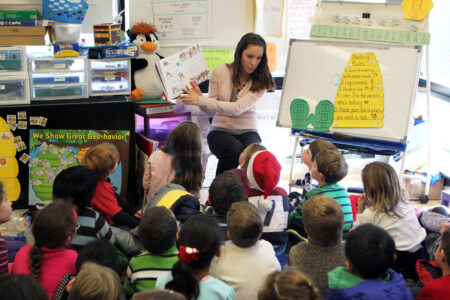 The K-4 division at Princeton Charter School is dedicated to starting young individuals along the path as life-long learners equipped with excellent thinking and academic skills and the understanding of good character and community responsibility.
The K-4 division at Princeton Charter School is dedicated to starting young individuals along the path as life-long learners equipped with excellent thinking and academic skills and the understanding of good character and community responsibility.
Through our program, students build a strong academic foundation to ensure success as learners in the future. We do this while also building an attitude of respect; respect for each other, for the faculty and staff, and for the school and its goals. Princeton Charter School strives to instill a healthy regard for the process of learning. Students learn problem-solving techniques to resolve conflict; skills that they can carry into adulthood.
After building a foundation of t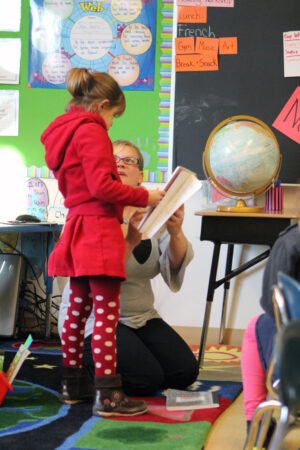 he basics, students are challenged to apply their knowledge to new situations and problems. Students engage in inquiry and analysis through discussion and written reflection in all grades. Writing is an important fundamental in the K-4 grades. We utilize the Lucy Calkins Writer’s Workshop approach to writing instruction. Written response and expression actively occurs across all subject areas including history, math, science, and foreign language.
he basics, students are challenged to apply their knowledge to new situations and problems. Students engage in inquiry and analysis through discussion and written reflection in all grades. Writing is an important fundamental in the K-4 grades. We utilize the Lucy Calkins Writer’s Workshop approach to writing instruction. Written response and expression actively occurs across all subject areas including history, math, science, and foreign language.
Our other academic cornerstone is mathematics. We begin arithmetic, number sense, geometry, graphing, and pattern recognition in kindergarten. At Princeton Charter School, we are equally proud of our other academic subject areas, taught by highly credentialed and qualified teachers. Princeton Charter School boasts an exceptional World Language program, introducing French and Spanish in Kindergarten three days a week. Students choose their language of study starting in kindergarten. World Language instruction occurs daily starting in first grade. Specialized instruction in science begins in kindergarten.
The K-4 building is the main entry point for Princeton Charter School students with two new kindergarten sections; however, there are a few openings in first, second, and third grades. Also, when students leave charter, move away, opening can occur at any grade level. New students and parents are supported with information sessions and access to out teachers, staff and administration to insure a smooth assimilation into our school.
Language Arts
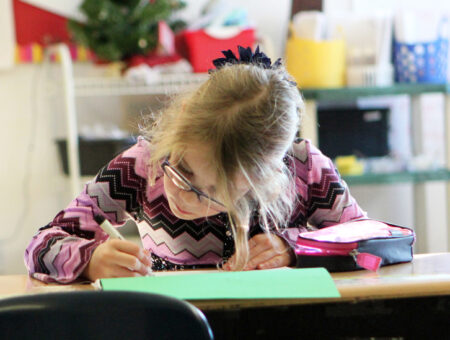 During the formative years, teachers are committed to meeting the instructional needs of young children so that foundational skills are mastered and students prepared for the rigorous curricula that Princeton Charter School offers. Students in kindergarten through fourth grade are guided through an enriching, stimulating, and comprehensive English program that includes listening, reading, writing, and oral language development. This curriculum is content-rich, includes a variety of genre and materials, and is based on best-practice research in Language Arts. The curriculum is reinforced by meaningful and purposeful daily home practice.
During the formative years, teachers are committed to meeting the instructional needs of young children so that foundational skills are mastered and students prepared for the rigorous curricula that Princeton Charter School offers. Students in kindergarten through fourth grade are guided through an enriching, stimulating, and comprehensive English program that includes listening, reading, writing, and oral language development. This curriculum is content-rich, includes a variety of genre and materials, and is based on best-practice research in Language Arts. The curriculum is reinforced by meaningful and purposeful daily home practice.
Explicit word analysis is taught through phonics, word and structural analysis, and use of context clues. Students are also engaged by a variety of genre: fiction, non-fiction, and poetry and are immersed in language through reading in a variety of groupings, for challenge and support. Comprehension strategies are taught by having students predict, infer ideas, summarize, and reflect on literature. On-going assessment guides and reinforces teaching practices. Further, students enjoy daily opportunities for sustained reading of choice-books at their independent level, and for teacher-chosen topics integrated in other areas of curricula.
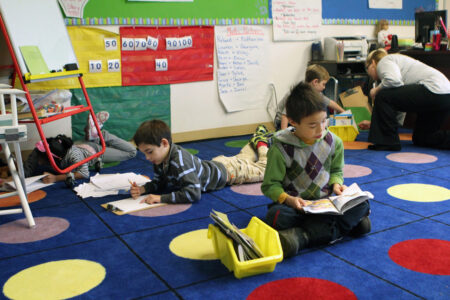 Young students at Princeton Charter School write daily in a variety of genre (narrative, expository, and poetry) following tenets of good writing. They share their writing with teachers, peers, students in other grades, and the community. Students write for both for practice and purpose. They write in response to what they read, write to inform and persuade, and write to learn the power of the written word. There are clear expectations for paragraph and composition development, along with mastering basic developmentally appropriate conventions.
Young students at Princeton Charter School write daily in a variety of genre (narrative, expository, and poetry) following tenets of good writing. They share their writing with teachers, peers, students in other grades, and the community. Students write for both for practice and purpose. They write in response to what they read, write to inform and persuade, and write to learn the power of the written word. There are clear expectations for paragraph and composition development, along with mastering basic developmentally appropriate conventions.
Overall, students are expected to express clarity of thought, read critically with fluency and expression, and write with purpose, as they continue to learn and develop through on-going guided practice.
For a full description of the language arts curriculum, click here.
Math
The K-4 math program is structured to help students cultivate their mathematical reasoning, problem solving, and communication skills. Students start in kindergarten by developing numerical and spatial sense. In first grade, students build on this by learning to count, and compute using whole numbers. In second grade, students strengthen these skills, and develop their mathematical vocabulary. Upon entering third grade, students have their multiplication and division facts memorized, and are emerging with fraction sense. In fourth grade students apply their mathematical vocabulary, and learn to compute with not only whole numbers, but also in terms of fractions and decimals. Each year in the K-4 program, students extend their knowledge in the areas of geometry, data organization, and analysis. To help students build a strong facts-based education, the K-4 math program uses the HSP Math program by Harcourt. Students start in kindergarten using the first grade book, and finish with the program in fifth grade using the sixth grade text. To cultivate problem-solving skills, students use the Singapore Math Problem Solving Program where they learn to pictorially represent math problems, turn pictures into mathematical sentences, and eventually into algebraic equations. The K-4 math Program gives students a strong factual foundation from which to develop into mathematical thinkers.
For a complete description of the mathematics program, click here.
Science
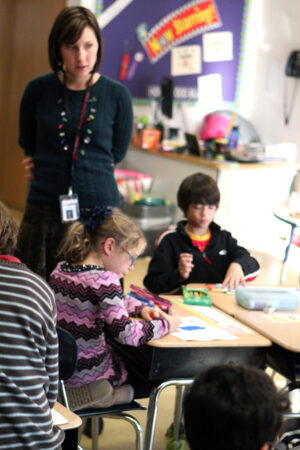 In science as in any other subject, children learn in an incremental manner. In early grades (K-3), science should be fun and stimulating, designed to make children explore and wonder about the world; to learn to ask questions, and seek answers. Backyard birds, magnets, the solar system, simple machines, and dinosaurs are topics which have intrigued children for years. In grade 4 the approach becomes more rigorous. Students start to ask quantitative questions and develop the ability to determine if they have enough information to answer them.
In science as in any other subject, children learn in an incremental manner. In early grades (K-3), science should be fun and stimulating, designed to make children explore and wonder about the world; to learn to ask questions, and seek answers. Backyard birds, magnets, the solar system, simple machines, and dinosaurs are topics which have intrigued children for years. In grade 4 the approach becomes more rigorous. Students start to ask quantitative questions and develop the ability to determine if they have enough information to answer them.
For a complete description of the science program, click here.
World Language
Following the New Jersey Core Curriculum Content Standards for World Languages, Princeton Charter School teaches a modern foreign language to every student in grades K-8. Students who begin study of a second language in elementary school and continue its study for a number of years have a much better chance of achieving full proficiency. The World Language curriculum at Princeton Charter is articulated and supported by thematically organized methods. World language instruction begins in kindergarten and expands to a full period daily in first grade, continuing through eighth grade. Classes meet each day (grades 1-8) to maximize exposure to the sounds of the new language and to provide as much immersion experience as possible.
In grades K-4 students are immersed in the study of foreign language through games, songs and dramatizations. Teachers use visual aids, stressing oral expression and listening comprehension. Cultural elements and basic vocabulary are introduced through stories, comics and civilization materials. Students are encouraged to develop interpretive, interpersonal and communicative skills through a variety of class activities, conversations, role plays and presentations.
In grades 5-8 short stories, poetry, and other authentic materials are used to focus class discussion and build reading comprehension, while studying written expression.
Milestones of achievement range from mastering a small set of phrases and vocabulary words in 1st grade, through genuine literary expression in 8th.
Throughout the program, classroom learning is supplemented by audio tapes, films, and computer software programs that allow students to build vocabulary, understand sentence structure, and practice the language skills taught. All students participate in the French and Spanish National Contest.
For a complete description of the world language program, click here.
History
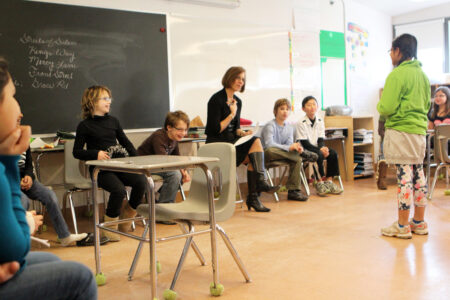 Princeton Charter School teaches history, geography, and social studies, from Kindergarten through the eighth grade. Children are introduced to history through folktales in kindergarten and first grade. Historical fiction and non- fiction texts enrich and bring to life history in grades two through four. By fifth grade, students embark upon a course of study that emphasizes political, economic, geographic, cultural, and technological forces which have shaped the history of the world and of the United States.
Princeton Charter School teaches history, geography, and social studies, from Kindergarten through the eighth grade. Children are introduced to history through folktales in kindergarten and first grade. Historical fiction and non- fiction texts enrich and bring to life history in grades two through four. By fifth grade, students embark upon a course of study that emphasizes political, economic, geographic, cultural, and technological forces which have shaped the history of the world and of the United States.
As demonstrated by the progress indicators in the Charter, the curriculum follows the guidelines of the New Jersey Core Curriculum Content Standards for Social Studies. In addition, our area’s rich history, offers the wonderful opportunity for PCS students to study history in a context that is familiar and tangible.
For a complete description of the history curriculum, click here.
PE
 In kindergarten, first and second grade, the goal of physical education class is to provide all students with a well-built foundation in basic movement. Students learn universal movement skills such as locomotor and nonlocomotor skills through activities, dance and games played in class. Next, students are challenged to perform their best and to be physically fit. In order to meet these challenges, students perform exercises and stretches that develop core strength. Finally, students are taught how to stay safe by displaying good spatial and body awareness.
In kindergarten, first and second grade, the goal of physical education class is to provide all students with a well-built foundation in basic movement. Students learn universal movement skills such as locomotor and nonlocomotor skills through activities, dance and games played in class. Next, students are challenged to perform their best and to be physically fit. In order to meet these challenges, students perform exercises and stretches that develop core strength. Finally, students are taught how to stay safe by displaying good spatial and body awareness.
In grades three and four, the goal of physical education class is to further develop the skills learned previously. Along with that goal, more focus is placed on being physical fit. Students are challenged to develop strength though use of their own body weight and abilities. Finally, the introduction of team concepts and strategies are integrated to promote cooperation and good team play.
Art and Music
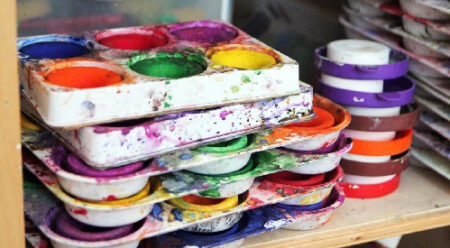 The arts are a fundamental component of the educational program at PCS. The curriculum includes visual arts, music, theater/drama, and folk dance. Following the New Jersey Core Curriculum Content Standards for the Visual and Performing Arts, our goal is to achieve art literacy for all students, i.e., to educate not only providers, but also recipients of the arts.
The arts are a fundamental component of the educational program at PCS. The curriculum includes visual arts, music, theater/drama, and folk dance. Following the New Jersey Core Curriculum Content Standards for the Visual and Performing Arts, our goal is to achieve art literacy for all students, i.e., to educate not only providers, but also recipients of the arts.
Arts education is best accomplished through participatory experiences. All PCS students actively “make art” from the earliest years
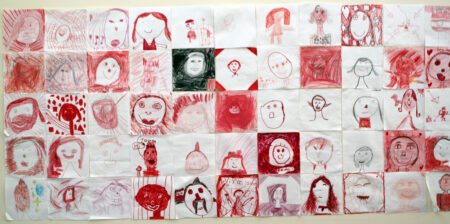 In music students are provided with choral singing experience, as well as age-appropriate classroom instrumental and recorder instruction. All students are exposed to notation and the basic rudiments of music theory. They learn about composers and study selected repertoire representing all periods of music. Combining sounds through their own improvisation and composition activities is an integral component of their music studies.
In music students are provided with choral singing experience, as well as age-appropriate classroom instrumental and recorder instruction. All students are exposed to notation and the basic rudiments of music theory. They learn about composers and study selected repertoire representing all periods of music. Combining sounds through their own improvisation and composition activities is an integral component of their music studies.
In visual arts, students learn the elements of drawing, painting, and sculpture. A variety of techniques for creating two or three-dimensional art are taught; creative explorations coexist with instruction in specific techniques.
 In addition to the art making” component, students learn the elements of each art form’s language. Differences and similarities among examples of the arts from around the world are analyzed. Uses of the arts, and conventions and fashions in the arts are discussed in conjunction with the study of art history. Students learn how to use the acquired knowledge, art vocabulary, and analytical skills to develop an aesthetic appreciation of the arts.
In addition to the art making” component, students learn the elements of each art form’s language. Differences and similarities among examples of the arts from around the world are analyzed. Uses of the arts, and conventions and fashions in the arts are discussed in conjunction with the study of art history. Students learn how to use the acquired knowledge, art vocabulary, and analytical skills to develop an aesthetic appreciation of the arts.
For a complete description of the art and music programs, click here.
Chess Instruction
Chess instruction is part of the Princeton Charter School academic program. Instruction
in chess:
- gives students access to a strategic thinking game that they may play throughout their lives;
- has a proven ability to improve reasoning skills and academic performance;
- provides opportunities for students to participate in healthy competition as an alternative or addition to athletics;
- provides a challenging, interactive game that crosses age and gender lines.
Multiple empirical studies have shown that after a course of chess instruction, students show significant improvement in their academic achievement in all academic areas including mathematics, science, reading, writing, critical thinking, and social skills.
Classroom instruction is designed to give students a comprehensive introduction to the game and the opportunity to improve both their understanding and their playing ability.
Lessons are composed from examples and from the demonstration of complete games played by famous players, other students in class, or players in scholastic tournaments. Students are given time in class to play with their peers with the instructor observing and giving instruction as appropriate
